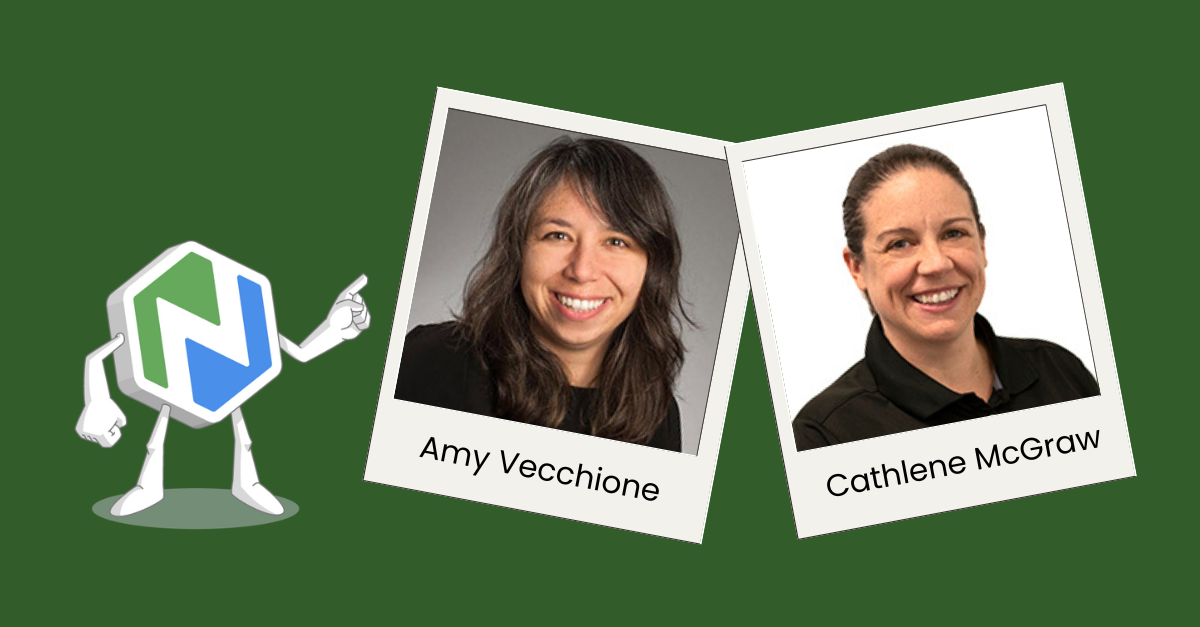Students have the content expertise and lived experiences to inform the practices guiding campus initiatives designed with them and/or with them in mind.
At Niche Academy, we’re people-focused. So in these Ask-an-Expert interviews, we connect you with leaders in the field to take a deep dive into important topics and trends. In this interview, we talk with Amy Vecchione, Assistant Director of Research and Innovation at the eCampus Center Extended Studies (Boise State University), and Cathlene McGraw, Remote Academic Advisor at Lundquist College of Business (University of Oregon) about how to build partnerships to impact student success.
Building Collaborations
Hi Amy and Cathlene. Can you tell us a little bit about how you came to collaborate with each other?
Amy: When Cathlene started working at Boise State, she visited the MakerLab in Albertsons Library. The MakerLab brings together a highly diverse group of students, and with Karina Smith, we immediately started to brainstorm the possibilities of how to support all of the students we serve. It was helpful to get to know advisors so staff in the MakerLab knew who to refer to. Ultimately, that became a collaboration to teach classes and cross-train on each others’ units. We learned a lot about the ways to collaborate better and best. We are all always learning and supporting one another.
Using Design Thinking and Collaboration
What is Design Thinking, and how does it influence your approach?
Amy: Design thinking is a process developed by engineers in the 1970s to include the user’s opinions first in the design process. I use this process in many ways, including designing personas of the audience I serve to ensure that I understand who should be front and center in any process. For me, student success is the driving goal of my work. A lot of times, this means doing action research and participatory research—having the users I serve work alongside me to design the product or service.
Why do you think collaborating with students is so important?
Cat: Students have the content expertise and lived experiences to inform the practices guiding campus initiatives designed with them and/or with them in mind.
Amy: Students are the ones using these services. They have expertise about where they are and what is happening in their lives. I have expertise too. Working together with your audience should help everyone be more successful because you won’t be surprised later about why certain groups can’t or won’t be able to use the library services you design. This can mean hiring them to design the services. This can mean paying them for focus groups or compensating them for consulting. Their description of their needs and what they want to see to help them succeed gives them agency, buy-in, and some modicum of control over their futures.
Action Planning for Student Success
How does this all come together in your Collaborative Action Plan?
Cat: Following each step ensures that a project or action item is moving forward.
Amy: I like to break things down into easy chunks, and the action plan can help you have a great starting point for that. Having an action plan will assist you in collaborating with others. It’s less important to follow things step-by-step, and more important to put the students first and know your “why”. It’s important to be flexible. As Dwight Eisenhower said, “Plans are nothing; planning is everything.”
Managing Long-Lasting Relationships
What do you think are the best ways to foster and nurture relationships with campus partners?
Cat: Two things. First, go to people’s offices and ask for 20 minutes or so just to go over their role and what brought them to campus. I tell folks that this is so that I can make the best referrals to students. But this approach also allows professionals to connect while taking the onus out of making small talk by couching the meeting’s purpose into a professional networking opportunity. Second, invite people to go to campus events with you or your department. I gave the example in the webinar of going with colleagues to a Native American Student Union Salmon Bake event. Campus partners can learn together about student populations while learning about each other through a shared experience.
Amy: Keeping your commitments. Do what you said you would do. If you offer to make a contribution, get it done early, and communicate that it is complete. If you can’t, communicate that in advance. This is the most important thing to building trust.
Build Partnerships in Your Library
If you’re ready to build strong campus partnerships, we’re here to help. The Niche Academy learning design team has created a number of helpful tutorials on topics like Building Relationships with Faculty and more. Start a free trial to get a sneak peek at some of our learning content and start making connections that turn into lasting relationships!

